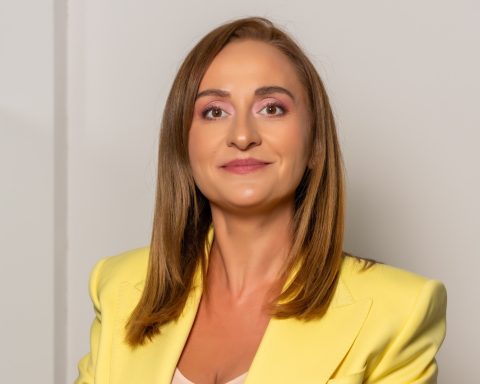On September 29, 2025, Bucharest will host one of the most important business events of the year: “The Future of Service Excellence”, led by Ron Kaufman at JW Marriott Grand Hotel . Recognized as the world’s leading expert in service excellence and the author of the bestseller Uplifting Service, Kaufman comes to Romania to inspire leaders and organizations to transform the way they create value and build loyalty.
In this interview, conducted by Adi Guțu-Gearîp, Ron Kaufman shares deep insights on the true meaning of service, how to build a value-driven organizational culture, and the challenges that artificial intelligence brings to human relationships. The conversation explores crucial themes such as service-oriented leadership, redefining excellence, balancing performance with humanity, and how Romania can cultivate a national culture of service.
This interview provides the perfect framework to understand the philosophy Ron Kaufman will expand on during his event in Bucharest—a unique opportunity for entrepreneurs, leaders, and professionals to gain practical tools and inspiration for building competitive and sustainable organizations.

Redefining Service: From Subservience to Value Creation
Adi Guțu-Gearîp: In many cultures, including Romania, the very concept of serving remains derided, overlooked. How does one cultivate service culture where the term itself invites contempt without succumbing into patronization or rhetoric?
Ron Kaufman: The problem is that the historical derivation, the etymology of the word serve, comes from the conquering of the Slavs, which is where the word slave originated. It meant subservient. It meant you no longer had power, you had to do what you were told. Out of that came “the customer is king” and “the customer is always right,” which made the service provider a subservient, less prestigious position.
But that denies the reality of what service produces. I wrote a definition of service: service is taking action to create value for someone. Service requires action, and the purpose of that action is value creation. That means the service provider is the creator of value.
If you are the creator of value, you are the generator of value — and that is power. You can create new value, added value, exceptional value, personalized value, premium value. Businesses exist to make money by having customers. Customers want things valuable to them. Who gives that? The service provider, the value creator. So we must stop thinking of the service provider as a “slave.” This is the person with the power to create, differentiate, and invent value.
This leads to the idea of uplifting service — taking the next action that creates more value for someone, even when the customer doesn’t know what that next step might be. Customers may not know what questions to ask, what comes next, what other customers have experienced, or what insights they might need. That’s when the service provider says, “By the way, you may want to know…” or “Since you’re concerned about this, let me help you prepare for what’s likely to happen next.”
At that moment, you’re not just a service provider — you’re a trusted partner, an adviser. You become the person they wouldn’t go to anyone else for, because you’ve built proactive, future-oriented service creation. A service partner has longevity, can charge premium pricing, and earns reputation, prestige, and margins. It’s a completely different understanding of service.
Building Service Culture and Facing Rejection
Adi Guțu-Gearîp: Have you ever encountered outright rejection of this philosophy? And if yes, how did you overcome it?
Ron Kaufman: Outright rejection? Let me think. Sometimes people find themselves in service positions but don’t care about others. In that case, there’s a fundamental conflict between the purpose of the organization and the motivation of the individual. That’s why service culture matters — it shouldn’t be up to every individual to decide every day whether or not they care.
You need cultural environments where people recognize themselves as part of a community. In such a community, members care about each other, about the customers, about their contribution. If leaders have people saying, “I’m just here to do my job, don’t ask me to do more, I don’t care,” then it’s not the employees’ fault — it’s the culture. The culture hasn’t created an engaging narrative that makes people want to bring extra effort, creativity, and commitment.
Service culture makes people say, “I like working here, I feel good doing more, I bring my full effort.” Without it, you get civil servants who’ve given up, part of bureaucracy, without enthusiasm or acknowledgment. Service leadership is key in changing that.
Principles of Building a Service Culture
Adi Guțu-Gearîp: That connects my first and second question. How do you create this kind of culture? Could you give me three or four basic principles on how to build it?
Ron Kaufman: Your question itself shows the problem. You asked for “one or two easy steps,” but then also for “fundamental principles.” Building culture isn’t a quick trick. Culture evolves over time, with groups of people. It requires focus and commitment.
Some people say, “I want to instill a customer service mindset into my staff’s DNA.” But that’s impossible. Culture isn’t injected like a pill. It’s historical. You can construct or evolve it, but not instantly.
I use the metaphor of building a house:
- The foundation is education — teaching what it means to create value, to listen, to be a trusted partner. This isn’t taught in schools, but it should be.
- The building blocks are areas like recruitment (who you hire), onboarding (what new employees experience), recognition (how successes are celebrated), and more — 12 building blocks in total.
- The roof is leadership behavior — what leaders must do and must not do to sustain uplifting service.
It takes time, focused attention, education, strong building blocks, and leadership.
Creating a Service Culture in Romania
Adi Guțu-Gearîp: How can you actually implement what you were saying in Romania?
Ron Kaufman: Let’s address it at the largest possible scale. How can your publication be respected, requested, referred to, and become nationally recognized — so that if someone holds a press conference, they call you, treating you like a national TV network or Associated Press?
That requires what I call listening to the listening of other parties. For example, look at the educators. Many are more concerned about their pensions than about their students, but they still run the schools, have the buildings, the budgets, the classrooms, and the children. How do we make them see you as their ally?
You must create stories that celebrate them, so they feel recognized instead of attacked. Maybe create recognition structures or challenges where some succeed — telling stories about their schools, students, innovations, results, or history. If you bring it to them as an invitation — “this is for you” — they will accept it. It’s not about criticism, but about celebrating and inviting.
Politicians need this too, educators, parents, family businesses, investors. Everyone needs to be included. And it all must be positive — invitationally positive, not rebellious like a teenager pushing back.
Romania is not a teenager anymore. It’s time to grow, to take action, and to stand for something, not just against.
AI and the Future of Service
Adi Guțu-Gearîp: Artificial intelligence now anticipates client needs before they are consciously expressed. At what point does service risk becoming subtle control? Can we still call it service if the recipient is unaware?
Ron Kaufman: It comes back to the question of value. If you’re in a hospital emergency room, unconscious, and the doctors act to save your life, you’re unaware — yet it’s still service, because staying alive is valuable.
But take a less extreme case. With AI we are moving from the attention economy (grabbing your eyes, keeping you clicking, triggering notifications) to the intention economy (guiding you toward what you should want). Suddenly people wake up asking, “What should I do today?” — not because they decided, but because AI knows them so well.
At what point is that still their own will, and at what point is it just following AI’s guidance? Being in a bad mood or feeling frustrated is part of being human. But what if AI says: “Never be frustrated again, I’ll guide you”? Should we accept that? At some point, it risks becoming a perversion of what it means to be human.
Being human means caring — about your body, family, community, society, ecology, and future generations. AI is accelerating faster than our biological ability to evolve. Language models use tools we created, but the pace is outstripping our moral reflection. We risk letting algorithms decide what we care about.
Adi Guțu-Gearîp: So what should we do? Should AI include ethical or moral baselines when guiding us?
Ron Kaufman: For sure, algorithms should not be harmful. But “harmful” is a judgment, not a fact. It depends: harmful to whom? Beneficial to whom? We must bring humanity back into the conversation of what do we care about?
Where is that conversation happening — in schools, in business, in industry? Rarely. AI is forcing it, but we are morally behind the algorithmic capacity. That’s a big challenge.
Adi Guțu-Gearîp: How can we find the willpower to challenge AI? For example, if it gives wrong numbers, how do we recognize it and push back?
Ron Kaufman: That’s a philosophical level humanity must come back to, with authenticity. My career has been about helping leaders and organizations create value, measured in profit, share, and price. But the deeper question is: what is well-being?
Philosophers ask, “What is a human being?” But the better question is, what is being human? Being human means living in a body, being mortal, having family, living in communities, being part of society, and caring about ecology. Caring means concern, but taking care means commitment and action. That’s what should be taught: language, mood management, cultivating trust, developing power, and taking ethical responsibility.
I call this kerology — the study and practice of care. And that’s what I’ll dedicate the rest of my life to.

Excellence, Leadership, and Ego
Adi Guțu-Gearîp: Excellence breeds higher expectations, sometimes creating relentless pressure on employees. How does one prevent excellence from morphing into systemic tyranny?
Ron Kaufman: It depends on the definition of excellence. If excellence equals perfection, then yes, it can become tyranny — anything not perfect is unacceptable. But if excellence means fulfilling agreed expectations — meeting the standards promised to clients, like in service level agreements — then excellence can simply mean doing what you said you would do.
Excellence can also mean going a little beyond: small, incremental, timely, useful, proactive, appreciated extra effort. That’s achievable and aspirational, not tyrannical.
Of course, in areas like aircraft engineering, excellence means 100% compliance with specifications, on time, with precision and zero tolerance for deviation. That’s another form of excellence. Even there, culture can aim for excellence without becoming tyrannical — it becomes aspirational. And shaping that culture is the leader’s job.
Adi Guțu-Gearîp: If leaders are expected to embody the highest form of service, how do you persuade a senior executive accustomed to authority that they must serve others? How do you reconcile this with entrenched executive ego?
Ron Kaufman: That’s a great question. This egocentric orientation of leaders comes from an earlier era — glorifying the boss, massaging their ego. But true leadership means encouraging, inspiring, educating, enabling, challenging, coaching, and supporting those you lead so that together you achieve more.
It’s a cultural transformation. History shows this — think of pre-revolutionary Paris, where nobility was so self-indulgent that revolution toppled them. Leaders must realize: you’re mortal, your business is temporary. Do you want it to survive? Do you want the next generation to succeed? That requires service-oriented leadership.
Look at Singapore’s founding father Lee Kuan Yew. He was tough, even brutal at times, but his vision was clear: meritocracy, no corruption, education, creating value, focusing on the future. That is leadership as service to society.
Adi Guțu-Gearîp: Do you believe fear plays a role in this? For example, in Romania there’s a culture of needing connections, secrecy, even bribery in small matters. Is this driven by fear?
Ron Kaufman: Fear may be too strong. I’d call it frustration, or concern. But equally, there can be hope and aspiration. The same situation can be seen as breakdown or as possibility.
Initiative matters. Do I repeat old practices, or do I initiate something positive? For example, I created cards that say “Keep it up. Thank you for uplifting service.” I give them to hotel staff, waiters, flight attendants. Even before they serve me, I initiate positivity. They smile, they feel appreciated, and the interaction improves.
We can teach this. My grandmother was a kindergarten teacher, and I learned from sports like ultimate frisbee, where the spirit of the game matters. Life is like that: it’s not only about winning, but about playing well together.
In Romania, too, the question is: will you drift in old practices of distrust and pessimism, or will you initiate positivity?
Therapy, Change, and the Zero Moment
Adi Guțu-Gearîp: I think if everybody would go through some kind of therapy for six months, this pessimism would go away. I experienced it with my parents. We talked every week for 30 minutes about something positive. Within six months, they started to smile.
Ron Kaufman: Who initiated this?
Adi Guțu-Gearîp: I did.
Ron Kaufman: Do you have a therapeutic background?
Adi Guțu-Gearîp: No, I don’t.
Ron Kaufman: Interesting. Do you know the etymology of “therapy”? It comes from “pertaining to the healing of disease.” But look at the word: dis-ease — without ease. It doesn’t have to mean medical illness. Family therapy, for example, is about releasing dis-ease. And you did that with your parents — you released some dis-ease and brought smiles. Good for you.
Adi Guțu-Gearîp: Workshops, manuals, and consulting — true transformation rarely begins there. In your experience, what constitutes the zero moment when an organization truly starts to change?
Ron Kaufman: There are two zero moments.
The first is alignment: when people agree on a concern and a commitment. It could be a crisis, or a moment of possibility, or a combination that sparks, like a chemical reaction. Suddenly everyone sees what’s possible and commits to it.
The second zero moment is when commitment turns into coordination. Concern without commitment is just worry. Commitment without action is frustration. But when people coordinate — initiate things, stop things, create, redesign, focus, and act — that’s when transformation happens. That’s where manuals, workshops, and structures play a role, after commitment becomes coordinated action.
Legacy, Entrepreneurship, and Sustaining Service Excellence
Adi Guțu-Gearîp: If compelled to distill your life’s work into a single epitaph, what phrase would you choose?
Ron Kaufman: A journalist once asked me this. The first phrase that came out was: “A life well-lived contributes to the well-being of others.”
Later, I refined it: not “a life” but “life well-lived contributes to the well-being of others.” Because life isn’t isolated. It’s not just about me, my ego. Life lived well always connects to others — family, team, community, society, future generations. In fact, we might even say:
“Life well-lived contributes to well-being.”
And that brings us back to the fundamental question: well-being of what, of whom? As humans, we are the kind of beings that care.
Adi Guțu-Gearîp: Entrepreneurs in Eastern Europe don’t enjoy Western corporate luxuries such as financing opportunities or long traditions of capitalist entrepreneurship. Immediate profit often dictates survival. How can one introduce and sustain service excellence under such pressures? What is the pragmatic application for small, resource-limited enterprises like startups?
Ron Kaufman: The objective is always to create value. If you only pursue your own fantasy without creating value for someone else, there is no exchange, no customer, no capital flow.
The key is listening to the listening: understanding what shows up as valuable in the customer’s world. In education, for example, young people may reject old systems, but if they ignore existing structures, budgets, and talent, they waste resources. Rebellion doesn’t build sustainable businesses. Success comes when you learn to speak and act in ways that provide recognition, clarity, or solutions to others.
The problem is, we’re not educated to be curious about others’ concerns. Education today ranks and scores individuals against metrics, rather than teaching curiosity for others — other cultures, other families, other customers. Yet that curiosity is what makes entrepreneurship succeed: walking in the world, sensitive to others’ aspirations, worries, and needs.
We also live in technological eras that reshape us. The word computer once meant women doing math for NASA. Then machines, chips, algorithms, and now AI. Our tools evolve, and with them, our culture. Money itself is a form of technology. These shape what it means to be human today.
So even for small enterprises in Eastern Europe, the principle is the same: create value for others, stay curious, and adapt culture to changing tools. That’s how you sustain service excellence, even under pressure.












